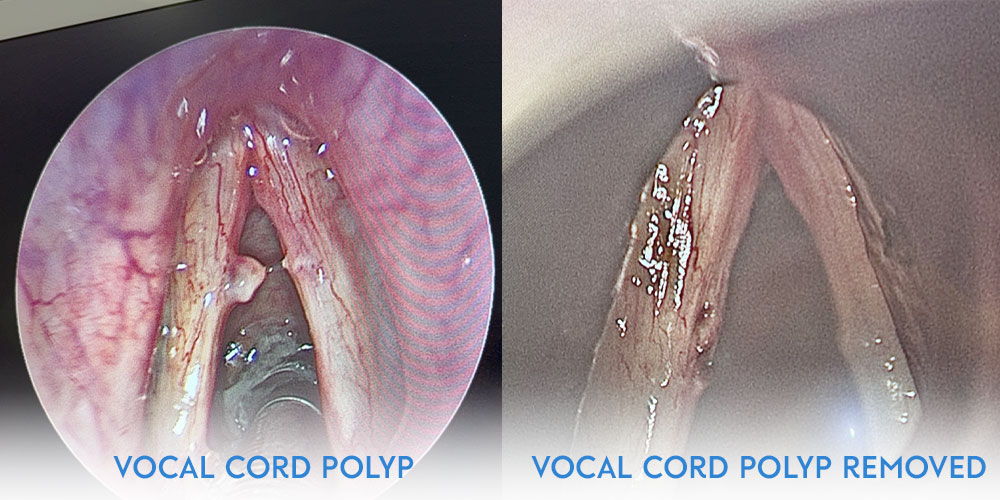I Have a Polyp on My Vocal Cord, What Should I Do?
If you experience persistent hoarseness, cracking, fatigue, or easy fatigue while speaking, especially if these symptoms persist for more than two weeks , you should definitely be evaluated by an Ear, Nose, and Throat (ENT) specialist. While these symptoms often indicate benign vocal cord disorders, in rare cases, they can be the first sign of more serious conditions.
During an ENT exam, your vocal cords are examined endoscopically, and formations like vocal cord polyps can be clearly identified. In this article, I will attempt to answer frequently asked questions by patients diagnosed with vocal cord polyps.
What is a Vocal Cord Polyp?
A vocal cord polyp is a benign lesion that usually develops unilaterally and occurs on the surface of the vocal cords . It often occurs after sudden and intense vocal trauma (e.g., shouting or prolonged loud speaking). Smoking, reflux, and prolonged vocal use using incorrect techniques also play a role in the development of polyps.
A polyp disrupts vocal cord vibration. This can lead to hoarseness, muffled voice, diplophonia, and rapid fatigue when speaking. Some patients may experience intermittent improvement in their voice, which can be confusing and delay seeking medical attention.

How Is It Diagnosed?
Diagnosis is made through videolaryngostroboscopic or endoscopic examination. These methods assess vocal cord vibrations and observe the polyp’s location, size, and impact on vocal cord vibration.
How is Treatment Planned?
The treatment approach varies depending on the patient’s voice use, the size of the polyp, and other accompanying vocal cord problems. The general approach is as follows:
- Voice Therapy: Regression (shrinkage) of polyps, especially small ones, can be achieved with voice therapy. However, most polyps require surgical removal due to their structural nature.
- Microlaryngeal Surgery: This is a short and safe procedure in which the polyp is removed using microinstruments under a microscope. It is performed under general anesthesia. The polyp is carefully removed without damaging the vocal cords.
- Pathological Examination: The removed polyp is always sent to pathology . This is important for the differential diagnosis of lesions with different cellular structures, although rare.
- Postoperative Period: Complete vocal rest is recommended for the first few days , followed by gradual vocal recovery . Voice therapy is then resumed during this period.
Questions Patients Most Frequently Ask
1-Is a polyp malignant? Can it turn into cancer?
No, a vocal cord polyp is a benign lesion. However, as with any tissue formation, the pathological examination result is important. Polyps do not become cancerous, but any removed lesions should be evaluated under a microscope to clarify the true cause of hoarseness.
2-Is surgery necessary?
Small polyps caught early can be reduced in size with voice therapy, but surgery is often necessary.
3-Will surgery make my voice worse?
This risk is extremely low in microlaryngeal surgery performed by an experienced surgeon using the correct technique. In fact, voice quality often improves significantly . However, if voice rest and therapy are not followed, undesirable outcomes may occur.
4-Do polyps recur?
After polyp removal , if vocal hygiene is neglected , smoking continues, and voice therapy is neglected, recurrence is possible. However, with appropriate monitoring and habit modification, this risk can be significantly reduced.
5-Will I not be able to talk after the surgery?
No. Voice rest is generally recommended for 3-5 days after surgery. After this period, controlled speaking can begin. Working with a voice therapist during this period ensures safe voice recovery.
When Should I Consult an ENT Specialist?
- If your hoarseness lasts longer than two weeks
- If your voice cracks, becomes thin or tired
- If your throat hurts or feels itchy when you talk
- If you feel the need to clear your throat frequently
Consult an ENT specialist without delay. Remember: Early diagnosis is crucial for both voice preservation and treatment success.
In conclusion
Vocal cord polyps are benign vocal cord disorders that are completely treatable with the right approach. However, if neglected, they can negatively impact quality of life. For the sake of your vocal health, take hoarseness seriously and seek professional evaluation to take the right steps.


